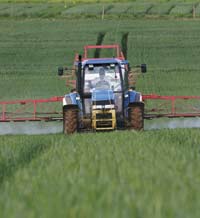Irish find less sensitive septoria strains to popular azole fungicide

Irish researchers monitoring Septoria tritici in wheat have discovered strains that appear to be less sensitive to the two key wheat azole fungicides, prothioconazole (Proline) and epoxiconazole (Opus).
Laboratory testing by Teagasc researchers at Oak Park in Carlow show a big shift in the amount of prothioconazole, in particular, required to kill septoria spores collected both last summer and again this spring.
The results have led the organisation to advise Irish growers as a precautionary step to avoid azole fungicides at T0, and to not use epoxiconazole or prothioconazole more than twice in the season, to minimise potential selection pressure for the insensitive isolates.
That’s not a step UK wheat disease experts feel is necessary at this stage for growers this side of the Irish sea.
“The risk of any change in performance this season is very small,” ADAS plant pathologist Neil Paveley says. “To see an effect all of the following would need to be true: That laboratory insensitivity translates to the field, which we don’t know; for there to be no or very low fitness cost to the septoria fungus – it might grow well in the cosy environment of a petri dish, but not in the field; and for the [less sensitive] population to dominate within a small number of generations.”
That is unlikely to have happened, he believes. “But it is perfectly feasible for a new strain to be present in small quantities in the UK after ascospore dispersal. They can travel quite large distances, which could mean we start to have problems next season, if all of those things turn out to be true.
“But we will have a lot more information by then. Teagasc is trying to identify whether there is a specific mutation, which if there is, can be screened to see how the isolate is spreading.
“And the HGCA appropriate fungicide dose trials also gives us a sensitive method of picking up change in performance at low rates.”
Bayer describes the prothioconazole findings as highly surprising and at odds with its long-term data sets.
“Teasgasc’s findings were based on in-vitro testing. Consequently we consider any claims for impact on field performance are based on extrapolation, which can be misleading,” the firm says in a press release.
“It is our view that further work is required to confirm the relevance of these preliminary observations for field performance in Ireland. There is no evidence for similar isolates in the UK or elsewhere in Europe.”
No need to change strategy
Broom’s Barn director Bill Clark also sees no reason to change strategies this spring.
He urges caution in interpreting the results, at least until they can be replicated by other organisations. “You have to be very careful with the methodology when testing these things, particularly prothioconazole, which is especially tricky in lab tests. There are several things that could have happened to give such a result.
“What is odd is that we haven’t seen any shift in field performance with prothioconazole. If there were real shifts in sensitivity of the levels suggested by Teagasc we would see it in field performance – and we haven’t.
“So for this season I would be very cautious and want to see some sharing of isolates and testing by others. Rothamsted has already asked for the isolates to test, and I would want to see some field results rather than laboratory tests.
“In terms of advice I would say no change. I would still use them as your primary azoles – in mixture with Bravo and boscalid – to form the basis of any septoria programme.”

